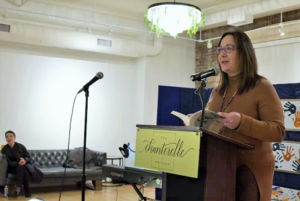Ontario Native Women’s Association hosts 7th Annual Poetry Night

By Leslie Knibbs
THUNDER BAY — The Ontario Native Women’s Association (ONWA) hosted the 7th annual Poetry Night at the Chanterelle Inn on the Park in Thunder Bay, on Nov. 25. The event was held in person and offered a virtual option through Zoom.
The Poetry Night was held in honour of the United Nations International Day for the Elimination of Violence Against Women on November 25. The 25th is the first day of 16 days of activism against gender-based violence ending on December 10, United Nations Human Rights Day. Through ONWA’s project, Strong Hands Stop Violence, ONWA is a keen supporter of this international campaign.
Colin Graham, a member of Ochiichagwe’ Babigo’Ining Ojibway Nation, performed the MC duties throughout the two-hour event introducing speakers, poets, and performers. Graham currently works at ONWA as a Community Development Manager. During the event, Graham, who is well known for using humour in his work, didn’t stray from his path. He considers humour a mainstay of resiliency amongst Indigenous communities and can be used as a means of healing.
Prior to the start of the event, Sara Kanutski (Sara Kae) performed two songs. Kanutski is an artist and member of Red Rock Indian Band, born and raised in Thunder Bay. Aside from performing, she is an on-call reporter for CBC, as well as a youth speaker supporting and encouraging positive lifestyles to Indigenous youth since she was 12 years old.
Following Kanutski’s performance, Graham invited Elder Kitty (Catherine) Everson from Lac Seul First Nation to give a prayer. Passwewe Ikewug Drum Group then performed an opening Drum Song before Executive Director of ONWA, Cora McGuire-Cyrette, gave opening remarks and welcomed everyone. She spoke proudly of how much the Poetry Night has grown over the seven years since it started; she recalled the first event held only drew a few people in attendance.
Following the opening remarks, Ojibwe poet Mary Black from Treaty 5 territory gave a reading of her spoken word poem, “Quiet,” then delivered an impassioned talk on her background as an Indigenous woman in Canada and the struggles she faced. Black has been said to use her voice as medicine:
“I will not be quiet, as the system steals our babies and keeps us living with less. The genocide isn’t over it just has a new name. No. When they told us they’d keep us safe they lied. If this was the case why are there so many suicides?”
For those who wish to listen to a complete reading of Mary Black’s poem “Quiet,” it’s available on YouTube.
Other poets scheduled to give in-person readings of their poems included, “They had names” by Ananya Pawtey; “Ovum” by Lisa Laforme; “Untitled” by Gail Pynee; “Nibi-Kwe” by Valerie Vickery (Read by Christine Mackay); “Genocide” by Obzidion; “At First” by Hilary Fox; “Constriction” by EJ Radford; and “Glass Eyes” by Claudia Lockman.
Online community submissions via Zoom included Colleen Toulouse with her poem “I broke free”; “Still” read by poet Theresa Jacko; “The Peaceful Warrior” by Kaluyuti; “Full Circle” by Mary Ann Sackabuckshkum; “Resiliency” by Susan Richards-Brant; “Debwe” by Faye Naveau; “The Kick in the Face Horses” by Alma Lee Byzewski; and “The Gains of Pain” by Cher Odediah. Susan Aglukark, a multi-Juno Award Winner, performed towards the end of the evening.
Guest Poet Al Hunter from Rainy River First Nation read three of his poems. Former Chief of Rainy River has authored three books of poetry, Spirit Horses and The Recklessness of Love, Beautiful Razor: Love Poems, and Other Lies. Hunter chose to read his poem, “Being be More”, inspired by the art of Norval Morrisseau, known as Copper Thunderbird.
The day after the event, one of the online poets, Colleen Toulouse from Sagamok Anishnawbek, shared how she came about writing her poem, “I broke free”.
“I was inspired to write, ‘I Broke Free’, to share some of my reflections on why I remained in an abusive relationship for so many years. Last year, I witnessed my good friend unite in marriage with a Blanket Ceremony and I thought back to my relationship… Symbolically, my blanket (relationship) was something that I wanted to work but it was so disruptive and it only made me worthless. It was really hard to get to where I am right now. I fled from Ottawa back to Sagamok. I was hurt and angry, but you know what, it was a great turning point in my life. It took a lot of courage to leave; I used support services for women in domestic situations. I had family and friends that also contributed to helping re-establish my life,” she recently said. “So, when I really thought about my previous relationship, it was really a vicious cycle. But I live with an understanding that cycles in the natural world, such as the four seasons, the 13 moons, and life cycles, are through creation. The abusive cycle is not a natural cycle, and it is something that can be broken. I broke free, I lived it, and came through stronger.”
The evening ended with a prayer from Elder Kitty (Catherine) Everson followed by a Closing Drum Song from Passwewe Ikewug Drum Group.
“Participating in last night’s event, had me happy and nervous. Hearing other women’s journeys through poetry—it was inspiring. I write creatively for self-care and I truly enjoy doing it. I now see life in a way where, as a woman, I am stronger than I think. Loving and believing in oneself, is the greatest gift I can give myself. I hope my poem resonates with individuals struggling with similar situations and encourage them to reach out for support.”


